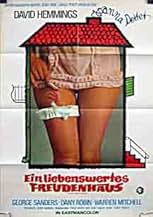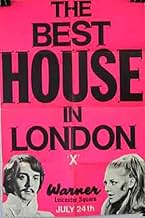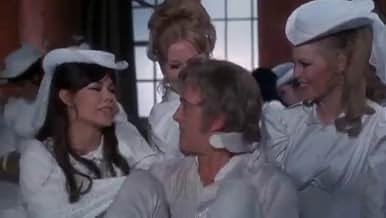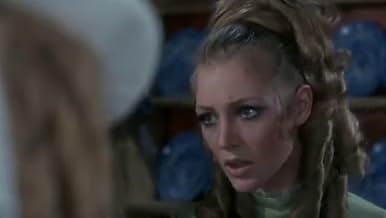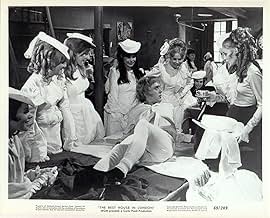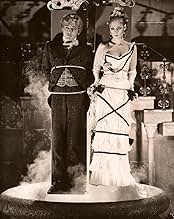In Victorian London, the British Government attempts a solution to the problem of prostitution by establishing the world's most fabulous brothel.In Victorian London, the British Government attempts a solution to the problem of prostitution by establishing the world's most fabulous brothel.In Victorian London, the British Government attempts a solution to the problem of prostitution by establishing the world's most fabulous brothel.
- Director
- Writer
- All cast & crew
- Production, box office & more at IMDbPro
Featured reviews
This is the 1960's and the wild, the wacky, and the wacky-baccy has started to get to people's heads. This is one of those films that you feel is going to end up with a speed-ed up chase scene with all that you have learnt so far carefully junked -- but it doesn't quite get there. Close -- but not quite.
However it is also a classic case of setting up a plot and not bothering with it after a certain point in time. Maybe it didn't fit in with the bare breast quota laid down by the producers or maybe they spent too much time try to work out how to best film down a woman's cleavage?
The casting of the (now late) David Hemmings in a double role (bad/good) is a fatal mistake because both characters act pretty much the same and we only have hair colour to tell one from the other. After Blow Up he was seen as hot property although he is a cold fish who can't act a jot!
If you don't come from England and don't know Victorian literature then a lot is going to fly over your head. Given that the jokes are rare enough already the film can't afford their loss -- especially to a world audience. Indeed some of the jokes are in very bad taste: A little girl singing about her "little pussy" while we focus on George Sanders doing double-takes wouldn't be allowed today.
The Best House in London doesn't really have a plot more a laundry list of things that they want to get in. A mad Italian with an airship, the temperance movement, the Suffragettes, the upper/lower classes, people that are pro/anti the whore trade and women that don't want to be saved from a life of vice. Big money has been spent on the sets (complete with half dressed girls) and the left over change has gone on the script.
This is the kind of stuff I like watching late at night when I can't sleep (TCM puts it on that this time) when on-screen energy means more than common-sense. I am giving it a seven because I was entertained, but maybe that seven says just as much about me, where I come from and what I like than it does about the film. I can forgive campy nonsense -- can you?
It's a sex comedy and it's an odd one. The central theme is that these women are being taken advantaged by these men. In the recreations, the women are gleefully being 'taken advantaged'. It's not a funny joke. The choppy nature of the film doesn't help. It's one vignette after another and few are even mildly funny. I don't care about Josephie and Benjamin. The plot does sometimes take interesting turns, but I still don't care. It's an unfunny sex comedy.
Some may consider films such as these "bad", and theoretically I guess they'd be right. But if you're even a passing fan of the British comedy tradition, this movie brings together an intelligent and funny script by the brilliant Denis Norden, and a large cast of inspired and famous British comics. Its outrageous premise offers scope for first-class humour, great inter-textual pedantry, and witty social commentary. In the tradition of the Goons, the film is a biting and staggeringly funny indictment of Victorian moralism and piety, which was as apt in the post-war decades as it is in the politically-correct eco-religious world of today.
If you object to seeing middle-class hypocrisies (not to mention none-too-innocent maidens) skewered, don't see it. Otherwise, I can heartily recommend it.
If you're a fan of British humour, you need this in your collection, alongside the Goons, the Pink Panther, Blackadder, Monty Python, Spitting Image and the collected writings of Oscar Wilde, Spike Milligan and PG Wodehouse.
Grand stuff.
More to the point the film illustrates the double standards of English society and its discomfort with the street variety as opposed to prostitution in general. What this further illustrates is that society is concerned more with being exposed to its double standards and how it perceives street prostitution without regard to the women involved who as the film portrays, are happy to participate in the profession. This point is illustrated in the film within context of the lack of opportunities for women to escape their impoverished lives in which there is no other options open to them.
The 'double standards' of the discomfort over street prostitution among the Victorian middle classes is illustrated via the character Josephine Pacefoot, (Joanna Pettet) who is in fact a satire of the famous Josephine Butler. Josephine Butler (1828 - 1906) was an upper middle class 19th Century philanthropic feminist who espoused the radical liberal tradition of the then Whigs as her Father did before her. Josephine Butler concerned herself with those deemed to be and as such labelled 'fallen women' giving street prostitutes a negative label by default. Butler was keen to rescue the so called 'fallen women' many of whom were criminalised via the Contagious Disease Acts of the 1860s. These acts permitted any unmarried woman to be subject to a 'virginity test'. If the woman failed the virginity test she was ostracised by society and prevented from gaining legitimate employment. This left many unmarried women vulnerable to men any of whom could request they have a virginity test for the purpose of recruiting them into prostitution if they failed and thereby trading these women. This point is illustrated in the film.
It is interesting that the 19th Century Contagious Disease Act affected women at the time of the rise of feminism in England. What The Best House In London illustrates is that feminism has a double edged sword. This double edged sword of feminism means the cause is a middle class one premised on liberation, the endeavours of which leave many poor and working class women vulnerable to exploitation, which in this film is illustrated via street prostitution. But it veers into all manner of legitimate employment as women are in most cases cheaper to employ as they're more likely of accepting lower wages that men reject.
The Best House In London is a series of sketches thread together via the issue of 'street prostitution' It seems that the original intention of the film was to reference as many as possible of the Victorian luminaries who shaped modernity and its attitudes.
For the issues it raises and the debate it permits, then The Best House In London is an interesting film produced in the style of Monty Python. In other words it's silly. It therefore illustrates that 'silly' is a positive as it exaggerates issues to express the point and as such is a clever method of comedic genre and satirical expressionism to coin a phrase.
Did you know
- TriviaThe second of four times that Thorley Walters played Watson, each with a different actor playing Sherlock Holmes. He previously did so in Sherlock Holmes and the Deadly Necklace (1962) starring Christopher Lee and later did so in The Adventure of Sherlock Holmes' Smarter Brother (1975) starring Douglas Wilmer and Silver Blaze (1977) starring Christopher Plummer.
- Quotes
Sir Francis Leybourne: [the Attache is sobbing] I thought you people were supposed to be inscrutable?
Chinese Trade Attache: Please, Sir Francis, China doesn't want any more opium.
Sir Francis Leybourne: Oh, do be sensible. You chaps have already lost one war with Great Britain about this.
Chinese Trade Attache: But to force us to buy it...
Sir Francis Leybourne: Well, you signed a treaty agreeing to!
Chinese Trade Attache: Your gunboats were right up our Yangtze!
Sir Francis Leybourne: No use getting hysterical, Mr Feng.
Chinese Trade Attache: Then let me appeal to our friendship; those happy weekends I used to spend at your townhouse; your late wife was always so kind to me. More than kind. She...
Sir Francis Leybourne: She was an eccentric about the inferior races. My dear fellow, I've put a lot of money into that opium plantation. Damn it, it's hard enough to get the Indians to harvest the stuff. Blasted natives! You pay them two pounds ten a year and they're useless.
Chinese Trade Attache: If you could see what the opium does to our people; they lie about the streets like dead flies.
Sir Francis Leybourne: Well, get them to use a little self-discipline, man. Self control - works wonders. Look at the English!
- ConnectionsReferenced in The Magic Garden of Stanley Sweetheart (1970)
- How long is The Best House in London?Powered by Alexa
Details
- Runtime
- 1h 37m(97 min)
- Aspect ratio
- 1.85 : 1

